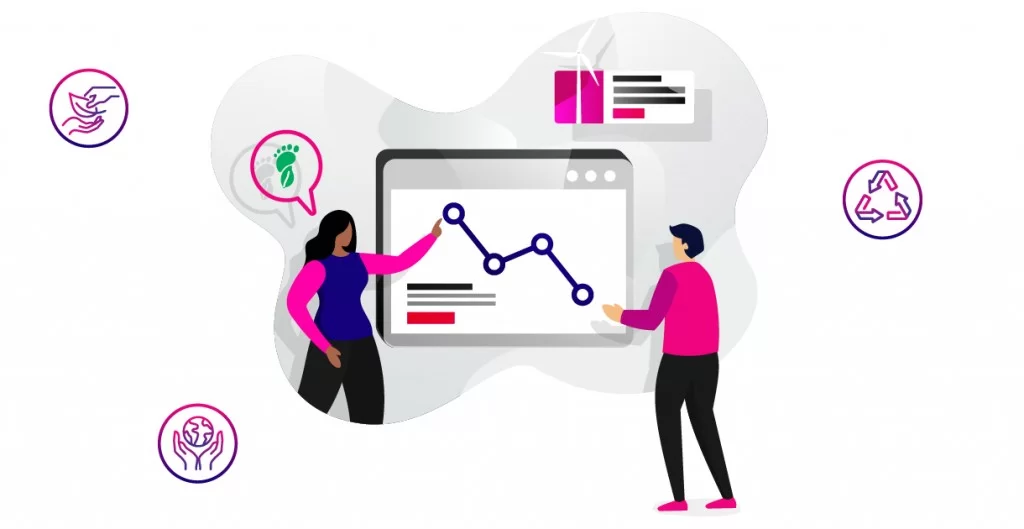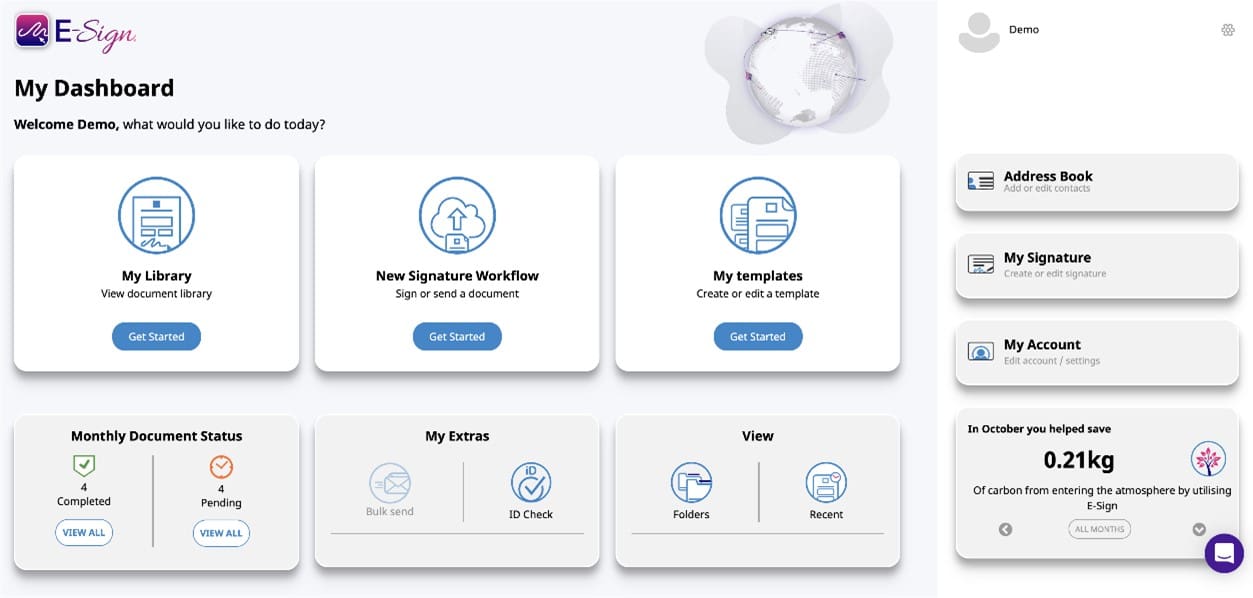Home | News and Insights | Reduce Your Carbon Footprint With Digital Document Solutions

Posted 29th October 2021
It’s safe to say that terms like ‘green’, ‘net-zero’ and ‘carbon-neutral’ are becoming increasingly popular in the business world. Whilst it’s easy to dismiss this as simply a fad, here at E-Sign, we see it as a sign that there’s a real change in the air; more and more businesses are looking to change their operations for the better.
With the UK Government aiming to reach a net-zero target by 2050, more and more businesses are looking to operate sustainably, eliminating waste and minimising their carbon footprint and energy usage, perhaps with the goal of reaching a net-zero target themselves.
Yet for many business leaders and managers, it can be difficult to know where to start. Implementing an electronic signature across your business is an easy way to eliminate paper consumption and waste, and, when paired with responsible energy usage and electronic waste management, could help to reduce your company’s overall carbon footprint.
Whilst trees are considered a renewable resource (you can grow more after all), when handled without sustainability in mind, the paper industry can contribute to some of the planet’s biggest challenges. Let’s take a closer look at how unsustainable paper production is harming the planet.
Deforestation
Whilst paper can be recycled up to 7 times, our insatiable appetite for paper often means that new trees are being cut down to make paper. According to the WWF, around 40% of all industrial wood goes into the paper industry and the production of materials like paper, cardboard, and tissues. When done unsustainably and unmanaged, this can have some devastating impacts on the planet, contributing to the already pressing issue of deforestation and threatening some of the most ‘ecologically important places and species’ (WWF).
Pollution
Unethical paper production can be a big planet polluter; the process of creating pulp and paper releases sulphur dioxide and nitrogen oxides into the atmosphere, both of which can contribute to acid rain; precipitation that upsets the pH balance of bodies of water and soil. The wastewater from paper production can also be a problem if not handled correctly, releasing alcohols and chlorates into water and soil.
Greenhouse Gas Emissions
As well as producing sulphur dioxide and nitrogen oxides, the paper industry also emits its share of greenhouse gases such as carbon dioxide and methane- both of which are major contributors to global warming. Data from 2018 put the industry as the third-largest source of greenhouse gas emissions in the EU, after the power sector and transport. Whilst the EU is taking steps to decrease this by 2050, it’s clear that current paper production is far from clean.
Water Consumption
Paper processing also uses a lot of water; it’s estimated that a single sheet of A4 pulp paper can guzzle up to 10 litres of water during production. Water is needed at nearly every stage of the production process and in some cases, is taken from natural rivers and lakes near paper mills. In some parts of the world, such as in Brazil, communities are suffering from water shortages and contamination thanks to the pulp production industry.
How much paper your business could save depends on your current usage and how far you’re willing to transform your processes. For businesses that rely heavily on paper-based processes, switching to digital documents could save a substantial amount of paper.
Here at E-Sign, we carried out a case study at a big law firm that adopted our e-signature and digital document platform. The savings they made on paper, money and their carbon emissions were substantial.
By implementing E-Sign, the law firm saved the following in 12 months:
Here at E-Sign, we’re proud to unveil our latest feature in our document management platform- our carbon counter. This handy new counter lets you see first-hand how much carbon you’ve saved each month by using E-Sign and our digital documents. No matter what kind of business you run or how much paper you normally use, you’ll be able to see how you’re making a difference with this handy tool.

Whilst the act of sending out a digital document for e-signing has a minimal impact on the planet, the hardware and energy required to do so must be taken into consideration when discussing the carbon footprint of a digital document. In other words, you need a device, electricity, and storage to work with electronic signatures and digital documents. This makes the debate about the true carbon footprint of a digital document far more complex.
The bad news? Even digital documents aren’t without their environmental impact.
The good news? Discussions about digital carbon footprint are increasingly coming into mainstream conversation- and big tech companies are actively looking for ways to make digital solutions more environmentally friendly.
Here’s some things your business should bear in mind when switching to digital ways of working.
Research carried out by the International Energy Agency found that data centres consume nearly 1% of global electricity demand, contributing to 0.3% of all global CO2 emissions. Switching from paper to digital documents means that more storage space will be taken up in data centres across the world. This all needs to be acknowledged and addressed as we move the way we work and live increasingly into the digital sphere.
The devices that we use to e-sign our documents also come with a carbon footprint and an environmental impact. Devices like smartphones, laptops and e-readers consume significant resources and energy during production. Electronic waste is also becoming an increasing problem for our planet, not only in volume but also in toxic materials such as lead and mercury. Some argue that all of this needs to be factored into the switch to digital documents.
Accessing and storing digital documents all takes energy- and where this energy comes from is yet another layer to this complex discussion. Energy not only powers your office but also any Cloud hosting you use to store documents and files. The source of this energy can have an impact on your digital document’s carbon footprint- green and renewable energy tariffs will mean your digital solutions have less of an impact on the planet.
Ultimately, switching to an electronic signature and digital documents doesn’t mean your business can get complacent. Digital technology still has an impact on the planet and your carbon footprint, it’s just harder to see the immediate effects. In the end, in order to get the most out of making this switch, you should still keep a watchful eye on your business’s tech and energy usage. This includes things such as:
With technology companies often releasing new versions of their products every year, it can be tempting to upgrade before you really need to. Maximising the life span of your devices will help to cut down on the resources and energy your company uses, as well as reduce tech waste and carbon emissions.
If your tech is eventually no longer suitable for your business, how you dispose of this can have a significant impact on your company’s carbon footprint. Recycling a laptop, for example, can offset 50% of the emissions that are released producing a new laptop, jumping up to 75% for laptops that you acquired second-hand to begin with.
Whilst you’ll no doubt need to store some documents as part of an audit process or for your records, deleting any old/useless documents or files can help to minimise your energy usage. It takes energy to store files in the Cloud, minimising the number of useless documents your business stores can therefore help to lower your energy and carbon footprint.
With data sometimes described as the new oil, your business should opt for a green hosting provider when it comes to your cloud storage solutions. Data centres consume vast amounts of energy to power servers and cooling. Choosing a hosting provider that powers their data centres with renewable energy can help to reduce your documents’ carbon footprint.
As our digital activity has a carbon footprint of its own, why not use a search engine that plants trees? This is exactly what Ecosia does. Using the profits from ad searches to plant trees, using Ecosia can help to offset some of your online activity, without costing you any money or inconvenience. At the time of writing, they’ve already planted 136 million trees!
If you’re looking to implement an electronic signature across your business, why not consider E-Sign as your dedicated provider? Try our 14-day free trial today and discover the paper- and money-saving power of E-Sign for yourself
Efficiency
The key to good workflow is optimum efficiency. E-Sign allows staff to work their core job more productively, utilising streamlined secure document processes.
Cost-Effective
Spend less time on administration and traditional paper-based expenses. Save on mail and associated expenditure.
Speed
With instantaneous delivery and rapid, secure authentication, there’s no need to wait days for document turnaround with E-Sign.
E-Sign is a leading provider of digital transaction management solutions, supplying professional services including Electronic Signatures, Web Forms, ID Checker, Verification Tools, Personalised Emails, API and Payment Processing to businesses of all sizes across the UK.
To find out more about our E-Sign solutions and how they could transform your business, get in touch with us today.